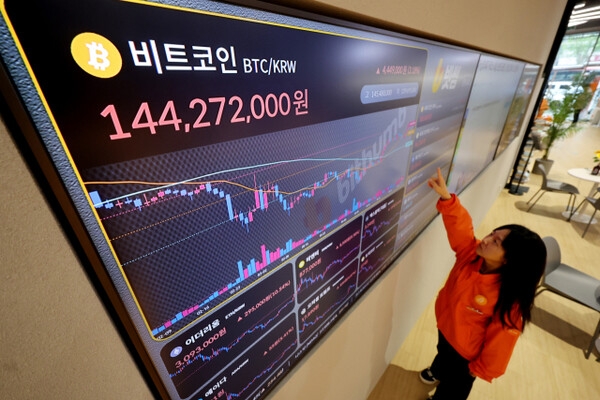
Despite criticism of Bitcoin as a 'non-existent fiction' or 'gambling', it has risen to 100 million won with expectations of being a future currency to replace traditional money. Globally, various attempts are being made for digital assets to be used as a means of currency. However, domestic authorities define coins as assets rather than currency. The legal regulations are hindering market changes.
According to the blockchain industry on the 11th, a check card called 'RedotPay' based on 'stablecoins' like USDT and USDC, which are pegged 1:1 with dollar value, has been introduced domestically. RedotPay is a blockchain fintech company established in 2023 with headquarters in Hong Kong. The check card is linked with Visa, a global payment company, allowing payment with coins at any Visa-affiliated merchant domestically and internationally.
Recently, stablecoins are emerging as a digital asset-based payment method. Stablecoins are virtual assets designed with minimal price volatility. They are designed to maintain stable value by being directly linked to specific assets like dollars or gold. They are being used for payment methods and financial services without being affected by virtual asset market price fluctuations.
However, there have been continuous suggestions that the payment process is not significantly different from existing credit and check cards. The industry emphasizes that merchants can reduce credit card transaction fees when paying with digital assets. They explain that merchants who save on fees can provide discount benefits to consumers. In February, the mobile payment service company Danal even held a 20% discount event for Pizza Hut orders through its PayCoin.
Overseas, virtual asset payment systems are being actively adopted. Tourism industry has been particularly noteworthy recently. This is because it can reduce exchange procedures and fee burdens during overseas travel and operate reservation systems at lower costs compared to existing credit card fees.
According to the 'Rise of Virtual Currency and Potential Payment Method Changes' report by the Yanolja Travel Research Center, Japan was evaluated as a leading country in incorporating virtual assets into the tourism industry. Japan's first tourism-specialized blockchain digital currency, 'Lura Coin', is being used as a payment method in tourist facilities across Japan, including hot springs, hotel restaurants, and souvenir shops. As of February, it is being used in over 300 local stores. The European Union is gradually introducing virtual asset payment infrastructure in some member states. About 25% of major luxury brands in Europe allow Bitcoin and stablecoins as payment methods.
Compared to overseas, domestic digital asset-based payment services are at a nascent stage due to regulations. Differences in virtual asset regulations between countries and lack of payment infrastructure are acting as barriers to widespread adoption. From the financial authority's perspective, coins do not satisfy any of the three conditions of money: storing value, measuring value, or serving as a medium of exchange.
The domestic blockchain industry is using various terms like 'coin', 'cryptocurrency', 'virtual currency', and 'virtual asset' interchangeably. This situation arose because there is no officially established concept, and the entity is not recognized. The government and Bank of Korea are extremely cautious about using the term 'currency' for coins. In 2021, former Minister of Strategy and Finance Hong Nam-ki mentioned in a press conference that "the government uses the term 'virtual asset' instead of cryptocurrency or virtual currency".
The virtual asset industry celebrates 'Pizza Day' as a monumental event. Pizza Day commemorates the first payment with Bitcoin on May 18, 2010, when two pizzas were purchased. The American programmer Laszlo Hanyecz, who paid 10,000 Bitcoin for two pizzas, explained that it was "an attempt to prove that coins could be used in the real economy". At current value, this pizza would be worth approximately 1.4 trillion won. Just as banknotes are essentially just pieces of paper, they gained value by promising global credit and becoming widely used. The virtual asset industry now annually holds discount events with premium pizza brand Papa John's around this time.
The first Bitcoin payment in Korea was in December 2013 at a Paris Baguette near Incheon City Hall, for a lunch sandwich and cafe latte, totaling 7,500 won. Following this, numerous online and offline stores began accepting Bitcoin as a payment method. However, due to high price volatility, almost no stores currently accept Bitcoin. According to BTC MAP data, there are only 61 Bitcoin payment stores in Korea, with 17 in Seoul and 9 in Busan. Most stores reported no Bitcoin payment cases in the past five years.
The virtual asset industry is expecting regulatory relief in the second half of this year following Lee Jae-myung's campaign promise to create a won-based stablecoin market. The candidate stated, "Dollar-based or US Treasury-based stablecoins are one of the core policies in the US" and "We must enter the won-based stablecoin market to avoid being marginalized and prevent national wealth outflow".








